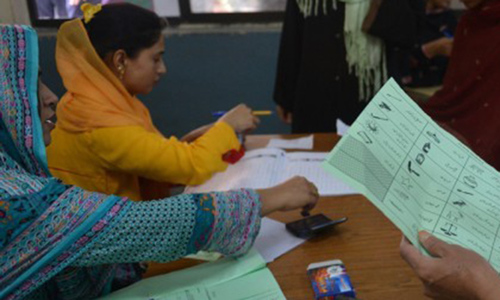WHILE watching television talk shows is a professional hazard, the inability to watch one in its entirety is another. Trying to make sure I can see what every channel is focusing on, and with which guests. turns one into a serial channel hopper, going back and forth till the eyes and heads are reeling.
But the other day, I managed to catch nearly an entire show during its repeat broadcast (fortunately, channels do not repeat their shows at the same time) on ARY. The focus was the fiasco that was the by-election in NA-249 and despite the presence of a PTI candidate, the real face-off was between the PML-N and PPP reps.
Between a phone interview with Marriyum Aurangzeb and Musadik Malik in the studio, we were told that the PML-N had asked for a recount because of the 276 polling stations in total, Form 45 for 167 of them was not signed. (Form 45 is the document which provides the number of valid votes for each contesting candidate. And it is supposed to be also signed by the presiding officer, assistant presiding officer, and the polling agents of the contesting candidates).
However, when the recount began for the Karachi by-election, all the major parties barring the PPP boycotted the count because the first bag, which was brought out, was unsealed and the candidates were not allowed to see Form 46. (Form 46 provides details of the number of ballots provided, those used and the number returned unused.)
Poll manipulation in Pakistan occurs in the run-up to elections and on election day itself.
Saeed Ghani, on the other hand, argued that the recount was, plain and simple, a recount. It didn’t include the opportunity to examine documents or verify them. Neither was he impressed with the Noonies’ complaints of the missing or unsigned Form 45. He wanted to know why the party or its polling agents had not complained of these irregularities in the entire day. Details such as how many ballots papers are delivered, are to be made public to the agents when voting begins, he said. Similarly, if Form 45 was not signed or handed over, why didn’t Miftah Ismail’s polling agents complain when counting ended? Why did the PML-N only raise these issues in the early hours of the next day when their defeat became evident (and long after counting had commenced)? He even went so far as to ask if the other parties’ polling agents were ‘duffers’.
Read: Govt proposes extensive electoral reforms to ensure transparency in future elections
Now let me explain why I found this interesting (aside from the fact that I get paid to keep an eye on such issues). Like all else with politics, our election day rona dhona is also a soap opera that keeps repeating key themes. We heard all about Form 45 during Daska for instance and much, much earlier, all of this had been discussed threadbare (as our newspapers are in the habit of doing) during the 2014 dharna and the inquiry report into the 2013 election. The only difference was that back then the forms were numbers 14 and 15 (instead of 45 and 46), and the allegations came from the PTI.
The 2015 report focused on the missing forms also — part of the PTI’s case in Punjab focused on the printing of extra ballot papers. Its argument was that the printing of extra ballots and their delivery to constituencies was proof of a ‘plan’ to change the election result (by ballot stuffing). And because of this, back then Form 15 had come under scrutiny during the judicial commission’s proceedings, for it showed the numbers of ballots delivered, used and unused at each location — according to the report, 35 per cent of the forms, countrywide, were missing.
But even back then, neither the report nor the parties ever explained what happened to their polling agents who were supposed to keep an eye on these forms.
The only explanation ever provided to those of us who don’t have the wherewithal to contest elections is that the agents were thrown out when counting began and the doors closed on them. But these mistreated, faceless souls then disappear. And the Election Commission of Pakistan (ECP) never thinks any of this is a cause for worry.
It can be said that manipulation of elections in Pakistan has two aspects to it. The first aspect is the run-up to the election, when heavy-handed tactics are employed to queer the pitch. This can include mysterious phone calls to electables asking them to switch loyalties or ostensibly legal decisions, such as deciding that Nawaz Sharif cannot head the PML-N. All of this, nonetheless, is rather obvious to us bystanders.
But the second part is what happens on election night. And here, between complicated rules and a general opacity (which parties seem to collectively agree on), it is hard to understand what happens. Bits and pieces come to the fore here and there to suggest a pattern.
For example, in the inquiry report, the PTI had alleged that the education secretary had been retained in the caretaker set-up in Punjab and linked it to the fact that 50pc of the polling staff came from the education department. Six years later, the PML-N accuses Saeed Ghani of playing an active role in the NA-249 election, partly because he is the education minister and in charge of the staff that was carrying out polling duties.
Indeed, every party has been the victim and the alleged perpetrator of this second type of manipulation. And despite consensual election reform in the past, these issues remain and are passed off as irregularities by the victors and rigging by the losers.
That the ECP is on the same page as the political parties on this is evident from the arguments the commission made during the inquiry into the 2013 election. It truly is one of the best lines from that painfully long report. The “learned counsel” for the ECP … when referring to Karachi “submitted that only general allegations had been made which did not prove that the elections had been unfair”. Enough said!
The writer is a journalist.
Published in Dawn, May 11th, 2021














































